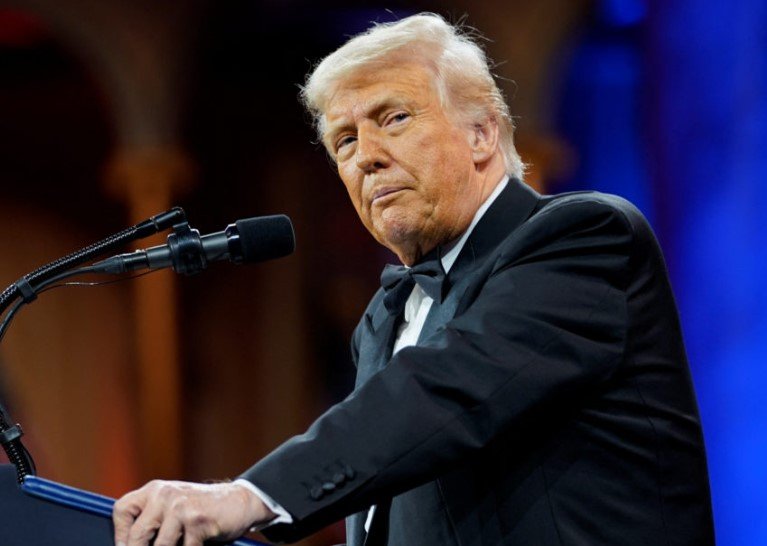Donald Trump’s latest remark about lowering drug prices wasn’t just ambitious — it left Americans scratching their heads, laughing out loud, and, in some corners, downright confused.
At a GOP dinner earlier this week, the former president boasted that, if re-elected, he would cut medication prices by 1,000%. Then 600%. Then 500%. Then 1,500%. The math didn’t add up — because, well, that’s not how percentages work.
The Speech That Sparked a Meme Storm
Trump started on solid ground, railing against pharmaceutical companies and the high cost of prescription meds in the U.S. It’s a bipartisan concern — no one likes to pay $300 for an inhaler that costs $35 in Canada.
But then came the moment.
“We’re gonna get the drug prices down,” Trump declared, pausing for applause. “Not 30% or 40%, which would be great. Not 50% or 60%. No, we’re gonna get them down 1,000%, 600%, 500%, 1,500% — numbers that are not even thought to be achievable.”
He wasn’t wrong about the last part.

Internet Reaction: Swift, Sarcastic, and Savage
Within minutes, clips of the speech flooded X (formerly Twitter), TikTok, and Instagram Reels. Most reactions had one thing in common — disbelief. And humor.
One user joked, “I just got my meds for -$80. The pharmacy paid ME to take them home. Thanks, Don!” Another added, “I feel like a requirement of being president should be understanding basic math.”
A few more gems from the viral comment threads:
-
“Trump just cured math with one sentence.”
-
“Drug prices down 1,500%? That’s free plus a refund.”
-
“My calculator just gave up and walked away.”
Memes featuring upside-down bar charts and exploding calculators quickly followed.
A Pattern of Numbers Gone Wild
This isn’t the first time Trump has raised eyebrows with numerical exaggerations. From inauguration crowd sizes to claims about trade deficits, his off-the-cuff estimates often blur the lines between hyperbole and confusion.
Economists and health policy experts have long criticized Trump’s style of making big, vague promises without backing them up with policy specifics.
This one, though, was particularly outlandish.
“It’s literally impossible,” said Matthew Albright, a health policy analyst in D.C. “If you reduce something by 100%, it’s gone. If you reduce it by more than 100%, you’re now paying people to take it. A 1,500% reduction means the government owes you 15 times the drug’s price just for using it.”
In other words, the math ain’t mathing.
Here’s What a 1,000% Price Drop Would Actually Look Like
To put it simply: it doesn’t.
But let’s play along for a moment. Say a medication currently costs $100. A 100% reduction brings it to $0. A 1,000% reduction would theoretically bring the price to negative $900 — meaning the government (or the pharmacy?) is giving you money.
Here’s a basic breakdown:
| Claimed Reduction | Cost of $100 Medication | Possible? |
|---|---|---|
| 30% | $70 | ✅ |
| 50% | $50 | ✅ |
| 100% | $0 | ✅ |
| 1,000% | -$900 | ❌ |
| 1,500% | -$1,400 | ❌ |
It’s not just unrealistic. It’s numerically incoherent.
Why It Still Works — Politically
Here’s the strange part: even when Trump misspeaks, exaggerates, or flubs numbers, his base rarely flinches. The broader message — “I’ll make things cheaper, better, easier” — still lands.
Many Trump supporters view his hyperbole as part of his personality, not a disqualifier. They’re not taking him literally. They’re taking him seriously.
“He’s saying what people feel,” one conservative voter told Fox Radio. “Drugs are too expensive. He wants them to be cheaper. The media gets caught up in the numbers, but people care about the outcome.”
Still, Democrats seized the moment.
Within hours, the Biden-Harris campaign account posted a screenshot of the speech with the caption: “Math is hard. Health care is harder.”
Will It Stick?
Some pundits think moments like this don’t matter. After all, we’re in a political climate where outlandish statements are common — and fact-checks rarely change minds.
But others argue that math-based flubs like these can accumulate, especially among independent voters who want at least a sense of realism.
“Swing voters are tired,” said Lina Rodriguez, a political strategist. “They want plans. Not punchlines.”
Whether this gaffe sticks in voters’ minds — or becomes just another moment in Trump’s highlight reel of chaos — is anyone’s guess.
One thing’s for sure: the memes will live on far longer than the applause.







